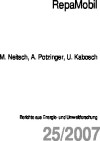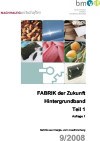Suchergebnisse für "Factsheet%3A Energietechnologien gestalten%2C die f%C3%BCr alle sinnvoll und nutzbar sind"
Straw pellets for small-scale combustion units
Assessment of the operation of straw pellets fired small-scale combustion systems. Investigation and assessment of different refractory materials with respect to corrosion and evaluation of primary and secondary measures to reduce gaseous and particulate emissions.
RepaMobil

Abbau von Markthemmnissen bei haushaltsnahen Produkt-Dienstleistungs-Systemen, insbes. Reparaturleistungen, durch Servicestellen an Standorten mit hoher Kundenfrequenz
Schriftenreihe
25/2007
M. Neitsch, A. Potzinger, U. Kabosch
Herausgeber: Bundesministerium für Verkehr, Innovation und Technologie
Deutsch, 158 Seiten
Downloads zur Publikation
FABRIK der Zukunft Hintergrundband Teil 1, Auflage 1

Sammlung von Projektergebnissen aus der Programmlinie FABRIK der Zukunft
Schriftenreihe
09/2008
Hans-Günther Schwarz, Mag. Sabine List
Herausgeber: Bundesministerium für Verkehr, Innovation und Technologie
Deutsch, 206 Seiten
Downloads zur Publikation
LTS Flywheel - Long Term Storage-Flywheel: New approaches for increasing the economically usable storage time and safety
Development of the fundamentals for a Long Term Storage (LTS)-flywheel for decentralized storage of electrical energy (e.g. from wind or PV power plants), with a significant increase in storage time (goal: 12 hours) and safety, featuring low system costs. Therefore, the LTS-Flywheel is an essential contribution to the building of the future.
PSS Strategies - Development of strategies for designing and implementing sustainable Product-Servicesystems
Based on a previous FdZ project it is intended to develop and implement strategies for sector specific sustainable product-servicesystems-innovations along product-chains in workshops with companies and other actors involved. Focus will be placed on implementation and possible restricting factors.
Countdown zum EASEY-Index
4. Juli 2002, 10:00-13:00 Uhr
Säulenhalle der Wr. BörseWallnerstrasse 8, 1014 Wien
Nachhaltigkeit - Eine Chance zur Belebung des Finanzmarktes Österreich
IEA ECBCS Annex 51 Experts Workshop: Energy Efficient Communities
2. - 3. October 2012
Tribühne Lehen, Tulpenstraße 1, 5020 SalzburgSalzburg, AT
Presentations of current results of research projects related to cross-building and energy optimised solutions for communities with the possibility of discussion and networking of national and international experts.
Conference: Smart Grids Week - Linz 2011
May 24th-27th, 2011
Power Tower, Energie AG Oberösterreich, Böhmerwaldstrasse 34021 Linz, AT
The Smart Grids Week - Linz 2011 is to contribute significantly to the development of electricity infrastructure in Austria and to continue the interconnectionprocess with international developments.
IEA HPT Annex 63: Impact of heat pump placement on noise emissions
Noise emissions from heat pumps are a potential barrier for broad market diffusion of this energy efficiency technology, especially in urban areas. In this project, the influences of noise emissions in the building and in the neighbourhood are characterised, their psychoacoustic effects are analysed in more detail, and tools for digitally supporting heat pump placement are further developed. The results will be presented to relevant target groups in the form of guidelines and other documentation.
KLIMADEMO VIS-A-VIS: Participatory realization of a climate-neutral demonstration building Vis-à-Vis
Participatory development of a pilot project at the interface between climate neutrality, affordability and multi-storey wooden housing based on well-founded decision-making bases in terms of renewable materials and renewable energies. The result is a multipliable carbon neutral building and the dissemination of carbon neutrality know-how to a larger audience.
Modular and standardised passive houses in solid timber construction
Concerning to an accurate and adaptable construction of 2 to 4 storey solid timber houses with the characteristics of a passive house, a digital construction and dimension system will be developed. The system which contains standardised modular ecological detailed solutions enables an exact dimensioning and installation of passive houses by small carpentering companies.
Webinar: EBC Technical Day - Energy innovations for the city of tomorrow
June 24th 2020
Online
The Webinar highlighted activities of the IEA TCP ”Energy in Buildings and Communities” (EBC) as well as results from Austrian R&D projects funded within the Austrian research and technology programme “City of Tomorrow”.
Eco-efficient Product Service Systems
Step by step methodology for the development of future markets by the introduction of eco-efficient product service systems
Workshop on Photovoltaic Performance and Reliability
8. April 2016
EURAC research, Viale Druso, 1, Drususallee 139100 Bozen, IT
After the 14th IEA PVPS Task 13 experts group project meeting an international workshop will be held. Content will be Outdoor & indoor inspection methods, Performance monitoring and modelling.
Ecoleasing for technical commodity goods - Models of use on the example of abrasives
The aim of the project is, to come to general expressions on one hand of the market potential and on the other hand of the restrictions for ecoleasing in the field of technical commodity goods. Within the project an evaluation on the relevance of ecoleasing for the sustainable development will also be done.
Applications of the synthesis gas from biomass gasification - polygeneration
Polygeneration based on biomass gasification offers a great variety of applications of the synthesis gas. A fundametnal study will be carried out to assess technical as well as economical and ecological possible routes to produce synthetic products.
Establishing a logistics concept for an efficient collection of biogenous waste as input for energy recovery in biogas plants.
The basic organizational and technical conditions along with possible obstacles and critical success factors are investigated.
Mission Innovation Austria Online Event: Energy Communities - Findings from Innovation Programs and Pilots
23. April 2020
Online
The aim of the half-day webinar was to provide insights into energy communities and their opportunities and challenges arising from current market and regulatory regimes. More than 300 participants from 28 countries took part in the webinar.
Integrated Service Models for increased resource-efficiency in the business-to-business sector (INERIWI)
For the major resource intensive commercial sectors the real function of products will be ana-lysed and elaborated how to provide the function of the product without selling it. Based on the present material intensity of the branches the potential reduction of environmental burden by applying such models as well as economic and social implications will be deduced.
Architectural Concept for Musicians
Starting from the special needs of a specific user group, an Architectural Concept for Musicians will be proposed and realized, with Housing as principal functional usage.
